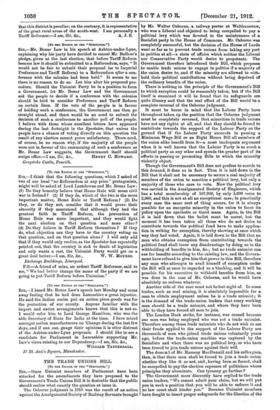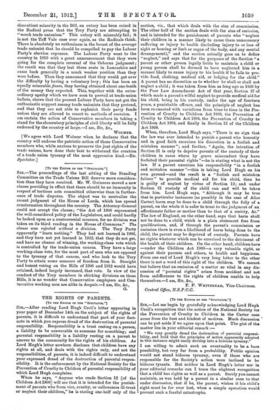THE TRADE UNIONS BILL.
[TO THE EDITOR OF THE " SPECTATOR:A
Six,—Since Unionist members of Parliament have been attacked for the amendments they have proposed to the Government's Trade Unions Bill it is desirable that the public should realize what exactly the question at issue is.
The Osborne judgment in 1910 was the result of an action against the Amalgamated Society of Railway Servants brought by Mr. Walter Osborne, a railway porter at Walthamstow, who was a Liberal and objected to being compelled to pay a political levy which was devoted to the maintenance of a Socialist party in the House of Commons. Mr. Osborne was completely successful, but the decision of the House of Lords went so far as to prevent trade unions from taking any part in politics at all—a state of affairs which neither the Liberal nor Conservative Party would desire to perpetuate. The Government therefore introduced their Bill, which proposes to enable trade unions to engage in politics if a majority of the union desire to, and if the minority are allowed to with- hold their political contributions without being deprived of the ordinary benefits of the union.
There is nothing in the principle of the Government's Bill to which exception could be reasonably taken, but if the Bill itself is examined it will be found that its safeguards are quite illusory and that the real effect of the Bill would be a complete reversal of the Osborne judgment.
It must be borne in mind that the Labour Party have throughout taken up the position that the Osborne judgment must be completely reversed, that minorities in trade unions have not any rights at all, and that they should be forced to contribute towards the support of the Labour Party on the ground that if the Labour Party succeeds in passing a Minimum Wage Bill or an Eight Hours Bill all members of the union alike benefit from it—a most inadequate argument when it is well known that the Labour Party is as much a political party as any other and spends the greater part of its efforts in passing or promoting Bills to which the minority violently object.
Though the Government's Bill does not profess to accede to this demand, it does so in fact. Thus it is laid down in the Bill that it shall not be necessary to secure a real majority of members of the union to sanction a political levy, but only a majority of those who care to vote. Now the political levy was carried in the Amalgamated Society of Engineers, which has a total membership of 107,000, by only 5,000 votes to 2,000, and this is not at all an exceptional case; in practically every case the same sort of thing occurs, for it is always possible for an energetic minority in the union to force its policy upon the apathetic or timid mass. Again, in the Bill it is laid down that the ballot must be secret, but the moment it has been taken all those who do not desire to contribute towards the political fund have to make applica- tion in writing for exemption, thereby showing at once which way they had voted. Again, it is laid down in the Bill that no man who obtains exemption from contributing towards the political fund shall incur any disadvantage by doing so in the withholding of benefits to him, &c.; but no trade unionist can sue for benefits according to the existing law, and the Govern- ment have refused to give him that power in this Bill, therefore any man who attempts to avail himself of exemption under the Bill will at once be regarded as a blackleg, and it will be possible for his executive to withhold benefits from him, as was done in the case of Mr. Osborne, and be would have absolutely no redress whatever.
Another side of the case must not be lost sight of. In some trades, such as coal mining, it is absolutely impossible for a, man to obtain employment unless he is a trade unionist; it is the demand of the trade-union leaders that every working man should be a trade unionist, and where they have been able to they have forced all men to join.
The London Dock strike, for instance, was caused because one man was being employed who was not a trade unionist. Therefore among those trade unionists who do not wish to see their funds applied to the support of the Labour Party are thousands of men who joined trade unions voluntarily years ago, before the trade-union machine was captured by the Socialists and when there was no political levy, or who have been forced to join trade unions against their will.
The demand of Mr. Ramsay MacDonald and his colleagues, then, is that these men shall be forced to join a trade union whether they like it or not, and , having been so forced, shall be compelled to pay the election expenses of politicians whose principles they abominate. Can tyranny go further ?
The Government more discreetly have replied to the trade union leaders, "We cannot admit your claim, but we will put
you in such a position that you will be able to enforce it and no law court shall hinder yon." Because Unionist members have fought to insert proper safeguards for the liberties of the dissentient minority in the Bill, an outcry has been raised in the Radical press that the Tory Party are attempting to "wreck trade unionism." This outcry will miserably fail; it is not the Taff Vale case over again, as the Radicals think. There is absolutely no enthusiasm in the breast of the average trade unionist that be should be compelled to pay the Labour Party's election expenses. The Labour Party went to the country in 1910 with a great announcement that they were going for the complete reversal of the Osborne judgment ; the result was that they lost three seats in Lancashire and came back generally in a much weaker position than they were before. Then they announced that they would get over the difficulty by having a voluntary levy ; this has been an equally miserable fiasco, they having obtained about one-tenth of the money they expected. This, together with the extra- ordinary apathy which we have seen to prevail at trade-union ballots, shows that the present Labour Party have not got the enthusiastic support among trade unionists that they pretend, and that they are not able to replenish their party funds unless they are allowed to resort to methods of coercion. I am certain the action of Conservative members in taking a stand for the elementary principles of civil liberty will be fully endorsed by the country at large.—I am, Sir, &c.,
WOLMEE.
[We agree with Lord Wolmer when he declares that the country will endorse the patriotic action of those Conservative members who, while anxious to preserve the just rights of the trade unions, have done their best to withstand the creation of a trade union tyranny of the most oppressive kind.—ED. Spectator.]











































 Previous page
Previous page